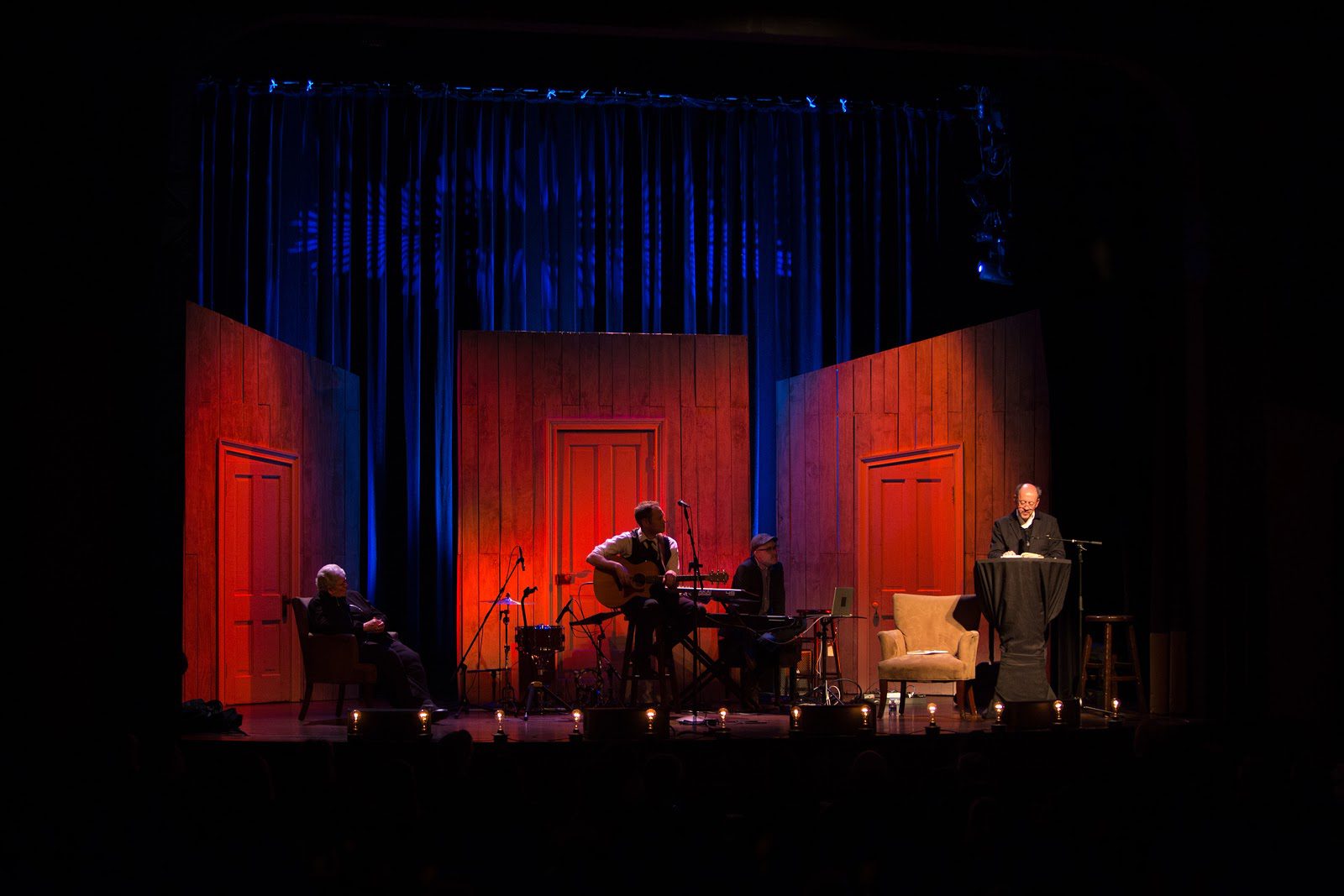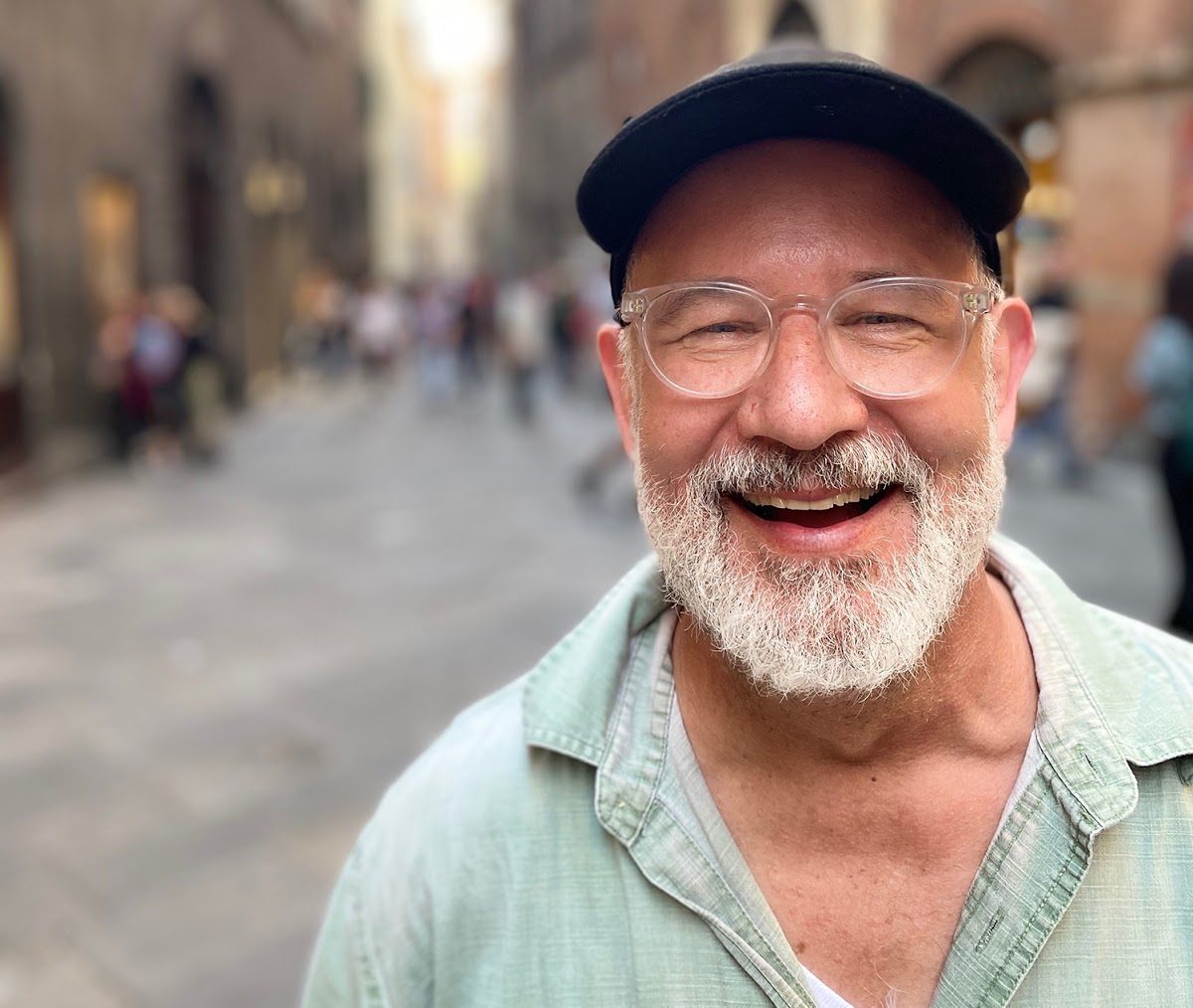Down a long country road just off the town square, over the train tracks, up on the hill, is a humble old house with a well worn path to the door, a door that many great artists have walked through in search of hope and healing. “A place to be real. A guide who understands. A story to be told.” That’s what Porter’s Call has offered the Nashville community since 2001, when counselor Al Andrews went knocking on the doors of Music Row to tell them their artists needed a special kind of support to thrive, one that would allow for the twists and turns of a life on the road and the unpredictability of fame and fortune. The first door to open was Sparrow Records who gave Al a generous grant to get started, with one stipulation — this would be for all artists, not just their own roster. In just three short months, it was evident that something transformative was happening.
The name and mission of Porter’s Call was born of a 5th century Benedictine tradition. Just inside the monastery gates, there lived a porter who, when a sojourner knocked on the door, would answer “Thanks be to God,” and welcome him inside. It was the porter’s job to help travellers find their way. Whether a bowl of soup, a bed for the night, a light for the darkness, or directions home, the porter was there. Fast forward to the 21st century, and over 3,000 artists have been welcomed by a small and steadfast group of “porters,” to guide them to whatever help they need.
Priest and author Ian Morgan Cron told Al Andrews in his Typology podcast: “You have one of the coolest jobs in Nashville. I probably don’t go a week without someone telling me, and this is not an exaggeration, ‘Al Andrews saved my life.’” We caught up with Al, ahead of this year’s beloved Evening of Stories, which will occur Wednesday, September 2, featuring Bear Rinehart of Need to Breathe, Drew & Ellie Holcomb, Amena Brown, Andrew Ripp, and John Acuff.
From the beginning of 2020 to now, how has your life changed?
At first like everybody else, I was experiencing a lot of anxiety. I’m gonna start with March, that’s when 2020 really started for me. Prior to this pandemic, if I have a problem, or I’m struggling with something, there’s always someone I can talk with who has struggled through the same thing. But there’s nobody I can talk to that’s been through the plague. I, like everybody else, was put off balance. As I talked to people, whether artists or friends, there was this low to medium to high grade anxiety, because no one’s been there before. I likened it to walking through the woods at night and maybe there’s some moonlight above and we can see just a little bit and we’re walking on the path, but somebody’s told us there might be a mountain lion in the woods — but there might not be. And so we’re waiting for a twig to snap and then we hear one, and… That’s how I describe my life. As people were talking to me, they would say, ‘I’m really so anxious,’ and I don’t know if this was helpful or not, but I would say ‘You should be! If you’re not anxious there’s something wrong, because we’re walking through the woods in the night and there might be a mountain lion out there! In fact, it’s gotten a few people.’ Just call me Mr. Cheer.
And what about now?
At first it was, you know, ‘what is this?’ And then it just started to sink in ‘I don’t know what to do,’ and there were so many mixed messages coming in from all over the place, so I settled into that, and began to find my way through the woods, find a flashlight if you will, having more conversations with people, because the more you talk with people the more you find you you’re not alone.
Frankly, over the time I’ve found that there are ups and downs in this thing. I wanna say it’s probably normal because I wanna to be normal, but I do find myself on this fairly gentle roller coaster, going up and down depending on the week and the day and then you add in whatever political party you’re with, the craziness of politics, the infusion of a lot of pain and death and racial tension, there’s probably a better word for that, just the issues that have risen to the surface partially because our attention can be focused on it, but partially because it’s just time and it’s true. There are so many little streams that are coming into this river that is us, that the water level is just rising and that water level would be stress on our bodies and our minds and our hearts. There’s just a lot of it.
What is the impact of the pandemic on your work at Porter’s Call?
Everybody is suffering during COVID, but the population that we serve, there’s a unique suffering. The way they do their craft or give their gift to make their money is just gone. It’s stopped. It’s over, and it will be the last thing that comes back, groups of people. So we’ve had a lot of people come, we’ve had to move to Zoom for a while, but we’re gonna try to go back soon because it’s so hard to communicate your heart on a video call. There’ve been a lot of questions around anxiety, depression and fear, and just some practical realities that don’t have answers. One of our staff said the other day, ‘I feel like Porter’s Call started 19 years ago for such a time as this, a service that’s free for artists to come and talk about what’s going on in their hearts when artists are not making money, it just feels like this is our time.’ We’re really glad to be here for it.
If someone has an emergency, we can see them today. We’re getting everybody in and if we can’t see them we’ll refer them to some of our affiliate counselors who get the artist life, but I’m grateful to have a job and a lot of my friends don’t have one. Often the creative backup plans like waiting tables or coffee shops, they’re not available, and you see the downstream effects in the little merch companies being gone, the bus companies shut down, 150 buses sitting in a lot, caterers, there’s just losses everywhere you turn. There’s a lot to do and there’s some answers, but a lot of time our job is just coming alongside, and just going ‘This is hard, and let us be with you in it.’ Because what I’d like to say is ‘Here’s a job, here’s an income,’ but it’s more like just being of help as we can. Being available.
Speaking to that, are you seeing any healing or relief or refuge in that same place of challenge?
Absolutely. People take on those challenges in different ways, they take it on according to their personality and to the way they usually deal with challenges. Some people go, ‘Alright, we’ve been the opportunity of time, although a lot of stress comes with it, to deal with the issues we’ve hidden — let’s do it.’ We’ve seen that over and over and that’s very hopeful for a lot of people.
In my favorite Emmylou Harris song ‘Beneath Still Waters,’ she sings, ‘Beneath still waters there’s a strong undertow, what the surface won’t tell you the deep waters know.’ BOOM! To me, I love that lyric, because it’s true for all of us, but I think for those who are willing to take that look, and have the time to do it because, when in the world has there been a time when artists will have been at home for a year and a half?! Never. And now they have time to delve into those issues. So yes, I’ve seen it and I’ve seen it in some of the songs that people have written about loss, and about hope in the midst of loss. I’ve shared a lot of poetry that I’ve found and that my wife has found that deals with issues of loss, one poem even called ‘The Pandemic’ by Lynn Ungar. It basically says, the pandemic as hard as it is, gives us an opportunity.

In the midst of all of this, we are heading into the 11th Annual Evening of Stories and I would imagine every year has its own sort of excitement, but this one in particular will be different…
Yes, let me tell you the background. It started out 12 – 13 years ago, my board told me we need to have a banquet, because that’s what nonprofits do. And I said, ‘So here’s the deal I can’t have a banquet because I hate to go to banquets. They usually have not-so-good food, I can tell you the menu — the drink is iced tea, and the desert is usually cheesecake, and there’s chicken and beans and a roll, sometimes potatoes.’ This is where the dark and cynical side comes out in me, I go to my friends’ banquets, but I would rather just send in $500 and stay home and watch TV, because I care about them, I just don’t like sitting around at tables. And I’m codependent enough to where I don’t want to have a banquet and have people thinking about me like I’m thinking about them.
I had a friend, Peter York, who was CEO of Capitol Christian Music, he told me about this NPR program The Moth, and I started listening to it and I thought, ‘what if we did our version of the Moth?’ Porter’s Call is about listening to the stories of people and helping them to redeem the part of their stories that need to be redeemed, but it’s really about people coming in and telling their stories and us helping them work through them, that’s really all it is. And that’s really all I think counseling is. So I thought it would fit with our brand better if we had a night of stories and why don’t we do a Nashville thing and do stories in the round? It started out where I got three storytellers, one of whom was a singer and we had them up on stage and each person would tell three ten-minute stories and we did our first one 11 years ago and it was a hit. There’s something about stories — we’re built for stories. People have told stories since the beginning of time. We go to movies because we like stories.
So it was this magical night — it was Donald Miller, the author/speaker, my priest Becca Stevens, and singer-songwriter David Wilcox. That was an amazing lineup. It’s grown every year since then and because I do like food, I just don’t like sitting around tables, we started having this really cool pre-show reception, and then we moved to the Franklin Theater and it’s grown since then. I’m so proud to say, we now sell sponsorships at $1500 for 2 seats to $25,000 for 10 seats. We sell out every year and people can’t come who want to come. People who benefit from having healthy artists support Porter’s Call and that makes sense, but there also others. One year, a banker told me, ‘I go to three fundraisers a week, that’s my job, but this is the first fundraiser I’ve been to, where I left feeling like I was changed.’
That’s so cool!
Yes! It’s the power of stories, the power of a good story always takes you somewhere else, takes you into your own life, you take the story and make it your own. This year we have speaker, author, storyteller Jon Acuff, and spoken word poet Amena Brown, along with four artists, Andrew Ripp, Bear Rineheart from NEEDTOBREATHE, a brand new country pop artist named Tiera, and Drew and Ellie Holcomb. It’s gonna be a fabulous night. It will be different, as it’s not live in-person. We loved having it live because the whole industry, which usually competes with each other, on this particular night comes out with a singular purpose. It’s a great night to be in a room together. We were sad that this year we can’t be in the room, but we’ll all be watching it together.
Evening of Stories is traditionally sold out months in advance, with tickets at $750 – $2,500 but for the first time ever, tickets are available beginning at $5.
In all of your time at Porter’s Call, being founder, counselor, director, what has been your favorite thing? Something that makes you say ‘I love this?’
You know people will often ask you if you do some kind of counseling work, ‘how do you do that?’ The question behind that question is, ‘how do you listen to people’s problems all day long?’ They do that a lot, and I wanna say, ‘How do you stand and sing in front of people? I would throw up!’ My answer is ‘Oh, it’s because I’m really selfish.’
Um, yes, people come to counselors because they have problems. I say I’m selfish because I get to see somebody change. I feel like a midwife. I get to help push this person out. It’s not my job to do the work, it’s my job to help people birth something new and that involves change. I do it cause I get to see that and it’s fun! And sometimes I don’t see that and sometimes sadly there’s a stillbirth and that’s very grievous. But there’s enough births and enough change and enough growth that just makes it Christmas and Easter all wrapped up in one. That’s the honest truth. That’s what I love about what I get to do, to see transformation happen in people that choose to move in that direction.





 Copyright
2024
Root and Vine
Copyright
2024
Root and Vine